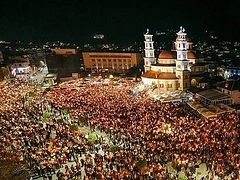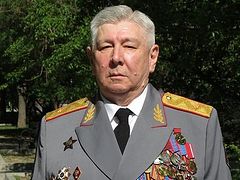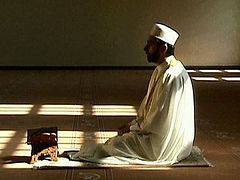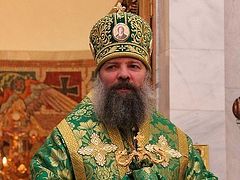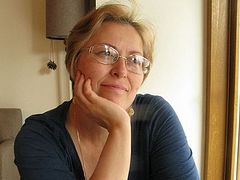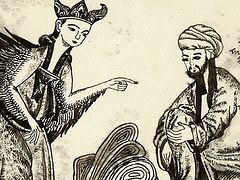A number of our readers have brought it to our attention that a writer whose works we have posted on OrthoChristian.com has converted to Islam. It the time in his life when he wrote those articles, he was a recent convert from Catholicism to Orthodoxy, and wrote rather convincingly about his conversion. We have not been able to get a confirmation of any new conversion from that author, but word is spreading that it is true. Some have suggested that we remove his articles from the site; so far we have not resolved to do that. We instead would like to explore the subject of “known” Orthodox Christians who apostatized from Christianity and became Moslems. We still hope that Islam is not the last stop for that man. But many would like to know: How does this affect the rest of us? This is not the first such case and is not likely to be the last.
In Russia, probably the first living authority on this subject who comes to mind is Fr. George Maximov, who co-labored with the reposed Fr. Daniel Sisoev. Fr. Daniel, an active missionary among Moslems in Moscow and other Islamic countries of the former Soviet Union, was murdered by a radical Moslem for having converted many from that religion to Orthodox Christianity.
The very mention of Fr. Daniel Sisoev leads us to underscore one of the most glaring differences between a convert from Christianity to Islam vs. a convert from Islam to Christianity. When an Orthodox Christian converts to Islam, other Orthodox Christians do not kill him or the person who converted him. This is an obvious but very important theological difference: We believe that every human being has his own free will, which we have no right to coerce—not to mention the commandment, “Thou shalt not kill”. We are supposed to be “wise as serpents and harmless as doves.” The murder of an apostate is not something that pleases our God. We can only pray for that person, and if the opportunity arises, try to convince him that he has made a grave mistake.
The Islamic world’s notoriety for taking that easy but violent route to keep Moslems Moslem is also one of the greatest hindrances to its own missionizing.
Back in the beginning of the twenty-first century, news was spreading around Russia about two Orthodox priests who converted to Islam. This of course was a real “find” not only for radical Moslems but also for the liberal press. Around that time, Fr. George Maximov was interviewed by a certain liberal publication that was preparing a spread on Russian Moslems and their “disappointment with the Church”. Not surprisingly, the interview with Fr. George was not included in the publication—it didn’t fit the intended storyline. Fr. George was asked:
“As far as we know, the Orthodox Church does not view the conversion of Orthodox Christians to Islam positively. What is the main argument in support of this negative view? Note that that person does not stop believing in God and keeps the commandments that are present in both Christianity and Islam.”
Fr. George answers: “Christianity is not simply the acceptance of some abstract God and a set of popular moral prescriptions. Christians believe in Jesus Christ—God Who became Man, Who does not simply send down directives “from above” on how to live correctly, but Who became one of us, lived amongst people and by His life, death on the Cross and Resurrection from the dead opened to us the path of salvation. A person who has become a Moslem does not believe in such a God. The Koran directly rejects the teaching that Christ is God and the Son of God (5.17, 9.30). If a Christian accepts Islam, it means that he has renounced Christ, Who said, “I am the Son of God (Jn. 10:36). And to such a person apply Jesus’s words: But whosoever shall deny me before men, him will I also deny before my Father which is in heaven (Matt. 10:33). He that believeth on the Son hath everlasting life: and he that believeth not the Son shall not see life; but the wrath of God abideth on him (Jn. 3:36). That is why this is a spiritual tragedy, about which the Church grieves. As for the commandments, they are different in different religions; they do intersect in places, but not so very often.”
He says that the Church in principle cannot prevent people from converting and cited the example of the martyrs, who despite imprisonment, torture, and death did not deny Christ. “Of course, the Church grieves over those who have left Christ the Savior for some other religion, including Islam, because it views their choice as erroneous. But this doesn’t figure in amongst the list of relevant Church problems because it is something that is basically marginal. I have heard of priests who at the request of relatives have had talks with people who have taken an interest in Islam. And certain authors have written apologetic texts that are intended to make such people think about this choice. But these are all private initiatives, and not some systematic Church-wide work.”
Fr. George was asked whether he thought that scandals around the Orthodox Church are one of the reasons why Christians have lost trust in their Church, and lead them to seek other faiths. He replied that indeed, those who stir up those scandals have that result in mind. “However, there is no observation that Christians have lost their trust in the Church. The number of parishioners has not decreased. An anti-church mood has grown amongst those who where only nominally Christian, but it cannot touch those who are truly religious. This is for the simple reason that the foundation of faith is the living relationship between man and God, which they obtained in the Church. This personal experience of life with God cannot be refuted by information that a priest or hierarch committed some sin. This is because there is no teaching in Orthodoxy about the infallibility of priests, and because it is not faith in priests that lies at the foundation of a person’s spiritual life. Our faith is called Christianity, and not ‘priestianity'.
“Of course, people sometimes grow cold to the faith and apostatize, but the reasons for this are much more complex, and that person himself rarely talks about them openly.” Fr. George went on to point out that people don’t just read about this or that problem in the Church and then rip off their crosses saying, “Enough! I’m going to be a Moslem!” Especially since they will find their share of scandals in any religion, including Islam. The real reason, he says, is much deeper than that.
Fr. George is a religion scholar and has particularly studied the Koran. He was asked what, in his opinion, makes people follow that religion. He replied that the vast majority follow it out of cultural tradition. Those Moslems who know their religion well, in his opinion, are stimulated by a feeling of exclusivity, which Islam gives to them.
In the course of his work together with Fr. Daniel Sisoev and after Fr. Daniel’s repose, he saw a number conversions both to and from Islam. Of course, most of the Russian converts to Islam are young ladies who have married Moslem men. However, there are also many cases when those ladies’ husbands convert to Christianity. Some Russians praise the Moslems for their sense of community, but those who have actually moved into that community are often disappointed with the reality. And many Moslems have converted to Christianity after turning to parishes for help in times of need and receiving that help, given with a love they had never before experienced, while their own communities had turned them away. He also knows many Russians who, after converting to Islam, returned to the Church in repentance.1
Most of the Orthodox Christians Fr. George knows who converted to Islam in fact knew little or nothing about their first religion, Orthodox Christianity. They had been baptized, but not catechized. A clear exception to that trend are the Orthodox priests who converted to Islam.
One of them, Vladislav Sokhin, was a priest in the Kursk diocese. He wrote, “In one hour I understood that I can no longer consider myself a clergyman. I cannot remain an external performer of Church sacraments.” In an article entitled, “Anatomy of Betrayal”, Fr. George commented on this incident, which at the time was big news in Moslem publications, the secular press, and Orthodox media.
“No matter how sad it is, falls and apostasy have always been and will always be. Spiritual life is a spiritual battle, and as in any battle, there are not only winners. This regards any Christian, no matter what clerical rank. Probably everyone has seen the icon, “The Ladder”, which visually portrays this spiritual battle. The demons tempt those climbing the ladder to Christ the Savior and try to pull them down into the abyss of hell, while the angels give the Christians strength as they climb.
“The danger of succumbing to temptation and falling can be found on any step of the ladder. Priests are also tempted—some with greed, others with vainglory, others with pride, others with schism, heresy, and these, well, with Islam. Some of these spiritual warriors find the strength to fight off the devil’s attacks, while others, alas, fall.
“The main commentary on [Sokhin’s conversion] was printed in the diocesan council’s statement: ‘When he was unable with his arrogant mind to measure and understand the whole depth of Orthodox faith and spiritual life, he decided to make a ‘better’ choice than did the apostles of Christ, the holy fathers of the Church, and the hosts of martyrs and ascetics of piety, and find truth elsewhere. Thus it happened that an Orthodox priest never had a personal meeting with Christ. This is a true spiritual catastrophe.’
“We could leave it at that if Mr. Sokhin had not gone further and published an interview in a propagandistic Moslem website, as well as the article, ‘My path to Islam’, in which he states his claims against the Church and Holy Scripture, which supposedly convinced him of the falsehood of Christianity.” At the time of Fr. George’s writing, Sokhin was actively participating in internet discussions and blaspheming Orthodoxy. Fr. George therefore felt compelled to use this opportunity to strengthen Orthodox Christians in the truth of their faith, and instruct any Moslems who might read it. He addresses Sokhin’s claims one by one. We will not reproduce this discourse here; perhaps this will be a future project. But we will translate the background information he provides on this ex-priest in order to better understand what happened in his life that may led to his choice:
On Priest Vladislav Sokhin
As we can see from the autobiographical portion of Vladislav Sokhin’s article, he was raised in a non-religious family, and as a youth he associated with “non-conformist groups in Kursk: hippies, punks, and heavy metallists.” Then one day he stepped through the doors of the Resurrection-St. Elias Church in Kursk, and... stayed there. “They noticed me and right away invited me to serve in the altar.”
Remember these words, “right away”. They will become the calling card of Vladislav’s entire, brief fate in the Church. Right away, from the doorstep, finding himself in the altar, the seventeen-year-old youth became acquainted with religious life in the church. A year later the head priest suggested to him that he enter seminary, and Vladislav right away became a seminarian in the Kursk theological seminary. There he studied for two years, got married, and then—right away!—was ordained a deacon. After that he transferred to distance education—that is, independent—reading tracts and books. Thus he finished seminary by correspondence, then also by correspondence studied three years in the St. Petersburg Theological Academy.
After only a half a year of the deaconate and three and a half years from the moment he crossed the threshold of the church, Vladislav was ordained a priest. Five years later he would publicly renounce Christ the Savior in the Moscow Mosque. Before that he had managed to head a parish, lead the youth council of the Kursk diocese, and teach history at the local seminary.
We have to admit that what happened with Vladislav Sokhin is not his fault alone.
Alas, many dioceses of our Church neglect the apostolic counsel: Lay hands (that is, ordain) suddenly on no man (1 Tim. 5:22)... When people who are not yet spiritually strong, against the many apostolic commandants, Ecumenical Councils, and advice of the holy fathers to the contrary, are made pastors, it is certainly no surprise that some of them trip and fall. It is the same thing as sending an inexperienced youth to battle. It’s both cruel and ineffective. And if all sorts of other responsibilities are placed on him right away, it’s the same as clapping officer’s stripes on the youth and sending him to the fore to command a battalion...
This person who has just been given a commander’s stripes will quite naturally have many ideas about reforming what he had not even had time to really understand but has already been sent to command. That is the path that Vladislav Sokhin took. It started with his wanting to reform the church services, to stand in the altar not with his back to the congregation but facing them, praying in the vernacular, and doing away with various “superstitions” such as the veneration of St. Matrona of Moscow... But suddenly his reformist zeal ran up against disapproval and misunderstanding: “I submitted a project for missionary church services and helped develop it myself. But then I was called to the carpet, called a renovationist, and the whole thing was shut down.”
The young reformer was offended. All those who knew him have said that he had his quirks. He even started making Moslem pilgrimages, and in his words, studied Arabic in order to study the Koran. (Interesting, did he put the same effort into studying the Bible?). His friends and fellow clergymen laughed at him. If he was not lying when he said that he was not given any attention, help, or support, then his friends and colleagues were remiss in preventing the tragic outcome. It’s hard to admit this, but if we don’t, then we can’t understand what happened and why.
So what happened? Why did a man who admits, “When I first came across Islamic literature, it seemed extremely boring to me,” now decided to repeat those same extremely boring theses? Why is it that a man who considered services in Church Slavonic to be too hard for people to understand now eagerly prays in imperfectly learned Arabic?...
In his conclusion to the article, which also includes an inter-religious dispute between another former Orthodox priest who became a Moslem and Fr. Daniel Sisoev, in which Fr. Daniel gives a thorough answer concerning the nature of God, Fr. George says:
“In many Orthodox internet forums there are discussions about the tragedy of ex-priest Vladislav Sokhin’s spiritual downfall, and opinions are expressed about the reasons for this move. Some think that it was the result of honest searching and perplexities, so to say, ‘sincere error’. Some suppose that the reason is much more earthly—feelings of resentment multiplied on other passions.
“To be honest, I don’t know who’s right... We have provided not only thorough answers to his anti-Christian criticism, but have also shown that his same criticism could be much more fairly applied to Islam...
“Now Vladislav has found out... that his new religion has the same defects that he cited about Christianity in order to justify himself for leaving it. If he is honest, he will now renounce Islam. If he starts trying to invent defenses of these Islamic defects, though he never tried to dig down to the truth of those long-ago defeated antichristian theses, then we will know that the true reasons for his conversion were other, unnamed ‘arguments’ that are much more prosaic and mundane, which have absolutely no relationship to questions of faith.”
 New Martyrs of the Turkish Yoke.
New Martyrs of the Turkish Yoke.
Fr. George cites the examples of Orthodox clergymen in the Ottoman Empire who for one reason or another renounced Christ, but then came to their senses and publicly renounced Islam—and immediately received a martyr’s death, all according to the Sharia law that any convert to Islam promises to obey. They understood that it would be better for them to die confessing Christ the Savior and go to Him in His glory than live without him in this life, in a religion they no longer believe, and then without Him in eternity. Fortunately for reconverted converts in non-Moslem nations, Sharia law does not hold and they can repent without the same probability of punishment.
And Fr. George personally knows such people who converted to Islam but then repented and returned to Orthodoxy. One of them wrote in a letter about his psychological state after betraying Christ.
“In that period I tried to show each and everyone how wise and intelligent I am, that I found the truth all by myself. I wanted to fling it to others in the face: ‘Remain in your lie, Christians; you believe in fairy tales and fables, while the truth is in Islam!” I was motivated by pride, drunk with the feeling that I am not like everyone else, since I chose Islam.
“Arguments arose in my family. I held up my nose higher and higher. Any Moslem, even the worst terrorist, seemed a worthy person in my eyes. This group was not right, but Moslems were always right, and that attracted me.
“The Koran, the internet, books, and acquaintances helped me to know about Islam. I drank it in. Turks are Moslems from birth. It never occurs to them to seek another way. But for me it was necessary to continually receive material on how Christianity is filled with lies and deceptions. Without this “feeding” I would begin to be overcome by a melancholy I couldn’t understand. Now however I understand what it was.”2
That state could be seen in Sokhin’s internet posts. As time went on it was clear that he was in continual search of new points of complaint against Christianity, in order to stifle his painfully dying conscience and convince himself that what he did was right.
But once the fanfare is over and, “the news of his apostasy has been consigned to oblivion, it will become harder to struggle with that inner feeling of yawning darkness,” Fr. George comments. “Perhaps through the prayers of his friends and family who remained true to Christ, he might find the strength in himself to repent. Or maybe not.
“And then it will be decided after his death, in the place where he will have to give an answer—not by internet, but standing directly before the radiant countenance of the crucified and resurrected Christ, Who said, Whosoever shall deny me before men, him will I also deny before my Father which is in heaven (Matt. 10:33).
“We, however, as the Kursk diocese rightly wrote, should follow the words of Scripture, not soon shaken in mind (2 Thess. 2:2), That we henceforth be no more children, tossed to and fro, and carried about with every wind of doctrine, by the sleight of men, and cunning craftiness, whereby they lie in wait to deceive (Eph. 4:14), Not forsaking the assembling of ourselves together, as the manner of some is (Heb. 10:25), but let us hold fast our profession (Heb. 4:14), having Jesus Christ our Lord as our steadfast hope in the coming glory (cf. Col. 1:27).
“We should also remember that a spiritual battle goes on in the heart of each of the faithful, and we should pray that the Lord might protect us from deceit and falls; and if it’s possible, that He would raise those who have fallen.”
From the time of Fr. George’s interview and article, two other Orthodox priests converted to Islam and were celebrated in Moslem media—Sergei Timukhin and Mikhail Kiselov. With Vyacheslav Polosin, the first famously converted priest, and Vladislav Sokhin, who converted six years after Polosin, that makes four (out of the roughly 23,000 Russian Orthodox priests). Now one can find information on all four of these priests through open sources on the internet. Apparently, only the first, Vyacheslav Polosin, is still a Moslem.
The former hieromonk, Mikhail Kiselov returned to Orthodox Christianity with repentance. He died a year later from an illness that he had suffered even before his conversion to Islam. Sergei Timukhin has been making the rounds of religions—Lutheranism, then Judaism.
Vladislav Sokhin moved as far as possible away from Russia, and no longer talks about religion at all in his blog posts. He has become a photographer and stated that the most important thing in his life is his camera. From various sources it is known that he has left Islam and become a Krishnaite. Perhaps after leaving Islam he has had to be a little “on the run”, in order to avoid serious threats to his physical health. Fr. George comments on his own Live Journal internet forum,3 “In general I think that a very large part of the ‘newly converted Moslems’ end up quietly leaving that religion. For obvious reasons their departure is not so pompously celebrated as was their conversion.”
Fr. George again emphasizes the need to be very careful about ordaining brand-new Orthodox Christians, or, we might add, foisting them in any way into a public Christian life. Perhaps their spurious conversions are simply their way of escaping the church and family responsibilities that they felt upon themselves as a sort of cage. Had they been left alone to simply work out their Christian lives as laymen, they might have found their self-expression in something less tragic, like professional photography. But having risen up to a place of pride, that same pride and shame of falling now hinders them from returning to Christ. Or, on the other hand, if they were not spiritually led in the right way as Orthodox Christians, if they never discovered the true depth of Orthodox Christianity, it was for them just another stepping stone on their circumlocutional spiritual path, and not the source of their lives. They were the shallow soil where the Gospel seed did not take root and grow. This variation seems to be the most common in our Western environment.
As for Christian-Islam conversions historically, we recall that Islam expanded territorially through conquest of what were once Christian nations, and as such it has always been a test of Christians’ faithfulness to Christ. And now, those Christians who have apostatized to Islam are also a test of our own Christian life: How sincerely do we pray for them, and what have we done to help them out of that temptation? Will we be there for them when they are ready to repent?




